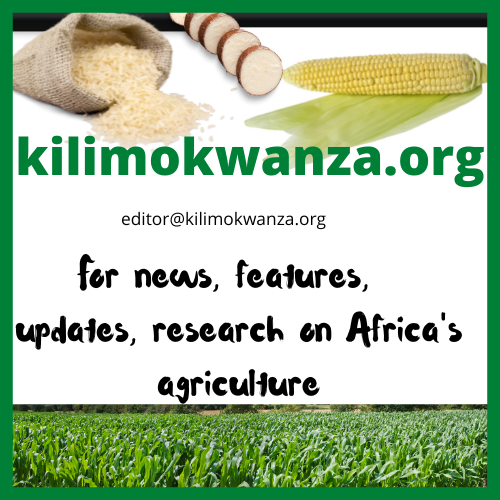Tanzania’s Agricultural Potential: The Indispensable Role of Sales and Marketing
By Lucy Msangi
There is so much untapped potential in Tanzania that, if harnessed through the power of sales and marketing, could significantly transform the agricultural landscape, propelling our nation into a future of prosperity and sustainability. As advocates for agricultural advancement, we at KilimoKwanza.org have witnessed the burgeoning capabilities of our fertile lands and the tireless dedication of our farmers. Yet, despite these assets, the full potential of our agricultural sector remains just out of reach. This opinion piece is a clarion call to action, emphasizing the indispensable role of sales and marketing in revolutionizing Tanzanian agriculture.
Broadening Market Access: Bridging Farmers to Prosperity
The narrative of Tanzanian agriculture has long been dominated by the image of the subsistence farmer, toiling day in and day out, only to harvest enough to feed their family. This image, while rooted in reality, does not have to define our future. By leveraging sales and marketing strategies, we can construct bridges that connect our farmers directly to local, regional, and international markets. Imagine the transformative impact of Tanzanian rice, maize, or avocados being readily available in markets across Africa and beyond. This vision can only be realized through deliberate marketing efforts that not only promote our produce but also ensure fair trade practices, enabling farmers to earn what they rightfully deserve. By doing so, we not only lift individual farmers out of poverty but elevate the economic standing of our nation as a whole.
The Power of Value Addition: Beyond the Farm Gate
Our agricultural produce, in its raw form, possesses inherent value. However, through value addition, we can amplify this value exponentially. Sales and marketing play a crucial role in this process by identifying market trends and consumer preferences, guiding the transformation of raw coffee beans into aromatic coffee products or fresh fruits into nutritious, packaged snacks. These value-added products do not merely fetch higher prices but also open new market segments, including health-conscious consumers and global markets seeking premium, organic products. By investing in branding and marketing, we can tell the unique story of Tanzanian agriculture, one that resonates with consumers worldwide, driving demand and fostering loyalty towards our products.
Knowledge as a Catalyst for Growth
One of the most significant barriers to agricultural growth in Tanzania is the knowledge gap. Many farmers operate based on traditional knowledge, unaware of modern farming techniques, market demands, or the potential of their produce beyond the local market. Sales and marketing initiatives can bridge this gap, providing platforms for knowledge exchange through workshops, agricultural shows, and digital media. By educating farmers on the importance of crop diversification, quality standards, and market timing, we empower them to make informed decisions that enhance their productivity and profitability. Furthermore, marketing campaigns can play a pivotal role in shifting consumer preferences towards locally produced food, thereby creating a robust domestic market for our farmers.
Embracing Technology: A Leap into Modern Agriculture
The future of agriculture globally is being reshaped by technological innovations. In Tanzania, the adoption of technology in farming practices is still in its infancy. Sales and marketing can change this narrative by highlighting the tangible benefits of technologies such as drip irrigation, precision farming, and digital marketplaces. Success stories of farmers who have embraced technology, resulting in increased yields and reduced labor costs, can be powerful marketing tools. By demonstrating the return on investment in technology through compelling marketing campaigns, we can encourage widespread adoption among the farming community.
Sustainability and Social Impact
The intersection of sales, marketing, and agriculture also presents an opportunity to address broader societal challenges. Sustainable farming practices, promoted through targeted marketing campaigns, can contribute to environmental conservation and climate change mitigation. Additionally, by emphasizing gender inclusivity in marketing strategies, we can empower women farmers, who are often the backbone of rural agriculture, ensuring they have equal access to markets, information, and resources. This approach not only contributes to economic growth but also to social equity and environmental sustainability.
The journey to transforming Tanzanian agriculture through sales and marketing is not a solitary one. It requires the collective effort of government agencies, private sector players, non-profit organizations, and, most importantly, the farmers themselves. As a community dedicated to the advancement of agriculture in Tanzania, KilimoKwanza.org calls upon all stakeholders to embrace innovative sales and marketing strategies. Together, we can build a future where Tanzanian agriculture is not only a source of sustenance but a beacon of prosperity, innovation, and sustainability.
Let this piece serve as a rallying cry for all those who believe in the potential of Tanzanian agriculture. It’s time to shift our focus from merely cultivating the land to strategically marketing our bounty. Through concerted efforts in sales and marketing, we can unlock the doors to new markets, elevate our agricultural practices, and ensure that every Tanzanian farmer reaps the fruits of their labor, both literally and figuratively.
In doing so, we not only secure the future of our agriculture but also lay the foundation for a thriving, prosperous Tanzania. Let’s embark on this journey together, with optimism and determination, for the betterment of our nation and its people.


